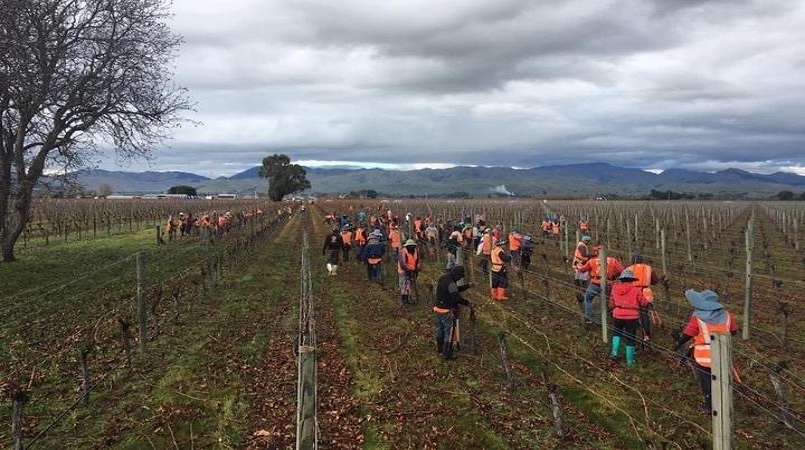
New Zealand's five-stage plan to reopen the border has come "too little, too late" for the RSE Scheme and does not spell the end of challenges currently crippling the industry, officials warn.
They say more could and should have been done to avoid the crisis facing the 2021-2022 harvest season.
From 28 February, New Zealanders will be able to arrive back from Australia and expatriates from the rest of the world can return from 14 March.
Aotearoa was expected to open to foreigners from visa-waiver countries such as the United States no later than July.
For those who benefit from New Zealand's Recognised Seasonal Employers (RSE) Scheme, the move had come "too little too late".
"Whilst we're appreciative that the working holiday visas are going to be reopened, it's going to be too late for our harvest which starts in a couple of weeks," said Terry Meikle, the chief executive officer of NZ Apples and Pears.
"So for us, the announcement is too little too late unfortunately.
"We are expecting a pretty good crop, good quality, good volumes and the question on everyone's minds is are we going to be able to get the crop picked?
"We really don't know. With everything that's going on including in the Pacific Islands. There are a lot of variables in the air at the moment," Meikle said.
He wanted to see more emphasis placed on the industry and the Pacific island countries involved in the RSE Scheme.
Call for review of programmes
There are issues about skilled people being drawn into the RSE Scheme and Meikle agreed "that is something we need to front-foot in our policy review".
"We could also look at if we need to expand this through more countries. How can we have better labour mobility between the countries.
"How might we be able to think about programmes that can be mobilised between New Zealand, Australia and the Pacific islands?"
It doesn't have to be one-way temporary migration for working in the RSE, it could be both ways, Meikle said.
"Partnership from the get-go is vital to get this right. That we have governments on both sides, workers, employers.
"Everyone is needed around that table so we can formulate what I believe we can bring to the world a temporary migration scheme that other countries may want to use, may want to mirror.
"Temporary migration is going to happen whether we make full-proof programmes or we don't," Meikle said.
"But it's much better if we can have a programme that's going to work for all parties and create win-wins."
There were about 7,000 seasonal workers still in New Zealand last August, most of them stuck there due to the Covid-19 pandemic.
The struggle to survive
Many employers expected to struggle to survive the 2021-2022 season unless they could refresh and increase their workforce through new recruitment.
In her research, New Zealand-based Charlotte Bedford of the Australian National University found there were normally over 10,000 workers at the peak of the RSE season in Aotearoa.
Following the New Zealand government's announcement, Bedford told RNZ Pacific echoed Meikle's comments that it had come "too little too late" for the industry.
Bedford said the labour supply had been a key challenge for the industry amid the pandemic.
Over 6,000 workers from Quarantine Free Travel (QFT) countries (Samoa, Tonga and Vanuatu) were scheduled to come to New Zealand before March and if "we had those arrivals then we would probably be in a better position".
"Everything is constantly changing due to Covid and most recently, the eruption in Tonga, and Covid arriving in Samoa and they have a lockdown. It's so complicated," she said.
"I understand they are trying to get other countries involved as well. Are working holidaymakers going to want to come to NZ while we are battling an outbreak of the Omicron variant of Covid-19? Will there be much demand?
"For temporary visa holders, there's the issue of visa processes. Do we have the capability to process large number of visa applications once people are wanting to come?"
Bedford said in Vanuatu, there was the challenge in finding people who were fully vaccinated, Covid-19 testing requirements, supply of passports "so it's a complex environment to be working in".
"It's good the NZ border is reopening but with most of the RSE countries grappling with Covid - Solomons, Fiji, Samoa and Tonga - there will be constraints on workers including isolating when they arrive in New Zealand."
Photo: Supplied/NZ Ethical Employers
